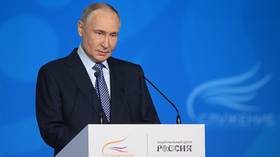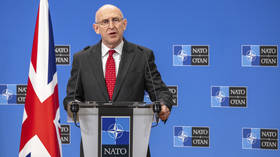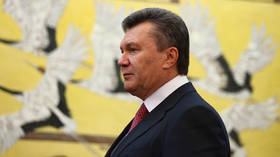Das foreign legion? Germany mulls recruiting non-citizens to its Armed Forces
A personnel shortfall in the German Army has apparently reached such proportions that the German defense chief has openly suggested recruiting people from other EU nations to the ranks of the Bundeswehr.
As Berlin struggles to put its troubled Armed Forces back on their feet, the German Chief of Defense, Erberhard Zorn, has seemingly devised an unconventional way to deal with at least one of its problems – the personnel shortage.
The German Army has significantly shrunk its ranks since the Cold War, especially after conscription was abolished in 2011. Since that time, the Defense Ministry, currently led by Ursula von der Leyen, struggled to fill the Bundeswehr’s ranks, as German citizens are reluctant to join the army of their own free will.
Also on rt.com German teens enlist in record numbers thanks to social media driveIn a seemingly desperate move, the Bundeswehr is now considering the recruitment of “EU-citizens” for certain posts as “an option,” Zorn told the German Funke Media Group. “We are talking here, for example, about doctors or IT-specialists,” the general emphasized, adding that given the human resources challenge, the German Armed Forces “must look in all directions and seek suitable trainees.”
The initiative also received backing from the German parliament. Hans-Peter Bartels, Parliamentary Commissioner for the Armed Forces, said that recruitment of EU citizens would be “a kind of normality” as the Bundeswehr already has “many soldiers with migratory backgrounds or dual-nationality citizens” within its ranks.
An estimated 530,000 EU citizens aged between 18 and 30 currently live in Germany, and these people could form a significant additional recruitment pool for the German Army. Berlin reportedly has gone quite far with its plans and has already consulted other EU governments.
However, such an initiative was met with resentment by other EU nations, particularly in the East. Bulgaria said it was concerned with the prospect of its educated young people being lured into migrating to Germany and joining its army. Poland’s Foreign Minister Jacek Czaputowicz also criticized Berlin’s plans by saying that any military service is traditionally “closely related to nationality.”
The opposition of other EU members is not the only obstacle the Bundeswehr would have to face on its way to turning its plans into reality. Germany’s own Military Act, passed back in 1956, still requires recruits to be German citizens and to swear allegiance to Germany's “free democratic constitutional order.”
In the meantime, the Defense Ministry is focused on other, more traditional recruitment methods. Earlier this month, von der Leyen boasted that uniformed soldier numbers would reach 182,000 by the end of 2018, which is 6,500 more compared to 2016's low point.
Also on rt.com Day X: Germany's far-right commandos reportedly plotted to kill top politicians when order 'falls'However, the Bundeswehr still plans to further increase its numbers, which should reach 203,000 by 2025. And it is seemingly ready to stop at nothing to achieve this goal. In January, it was reported that an elaborate and intensive social media campaign launched by the military had prompted German teenagers to join the army in record numbers. More than 2,000 soldiers under the age of 18 served in 2017.
Think your friends would be interested? Share this story!














